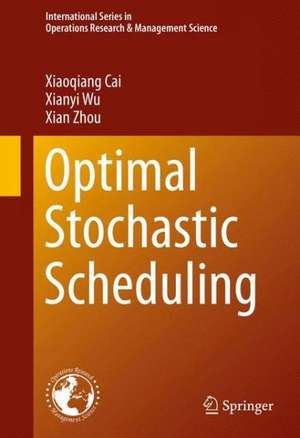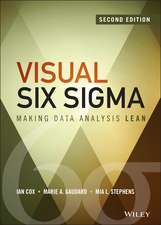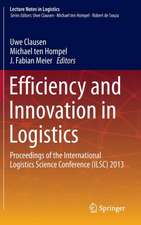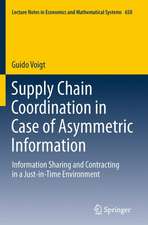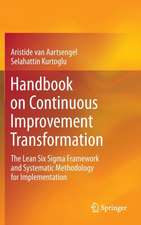Optimal Stochastic Scheduling: International Series in Operations Research & Management Science, cartea 207
Autor Xiaoqiang Cai, Xianyi Wu, Xian Zhouen Limba Engleză Hardback – 21 mar 2014
Optimal Stochastic Scheduling is organized into two parts: Chapters 1-4 cover fundamental models and results, whereas Chapters 5-10 elaborate on more advanced topics. More specifically, Chapter 1 provides the relevant basic theory of probability and then introduces the basic concepts and notation of stochastic scheduling. In Chapters 2 and3, the authors review well-established models and scheduling policies, under regular and irregular performance measures, respectively. Chapter 4 describes models with stochastic machine breakdowns. Chapters 5 and 6 introduce, respectively, the optimal stopping problems and the multi-armed bandit processes, which are necessary for studies of more advanced subjects in subsequent chapters. Chapter 7 is focused on optimal dynamic policies, which allow adjustments of policies based on up-to-date information. Chapter 8 describes stochastic scheduling with incomplete information in the sense that the probability distributions of random variables contain unknown parameters, which can however be estimated progressively according to updated information. Chapter 9 is devoted to the situation where the processing time of a job depends on the time when it is started. Lastly, in Chapter 10 the authors look at several recent models beyond those surveyed in the previous chapters.
| Toate formatele și edițiile | Preț | Express |
|---|---|---|
| Paperback (1) | 950.66 lei 6-8 săpt. | |
| Springer Us – 3 sep 2016 | 950.66 lei 6-8 săpt. | |
| Hardback (1) | 956.81 lei 6-8 săpt. | |
| Springer Us – 21 mar 2014 | 956.81 lei 6-8 săpt. |
Din seria International Series in Operations Research & Management Science
- 20%
 Preț: 331.25 lei
Preț: 331.25 lei - 9%
 Preț: 696.05 lei
Preț: 696.05 lei - 20%
 Preț: 570.61 lei
Preț: 570.61 lei - 18%
 Preț: 1132.02 lei
Preț: 1132.02 lei - 18%
 Preț: 773.72 lei
Preț: 773.72 lei -
 Preț: 170.39 lei
Preț: 170.39 lei - 17%
 Preț: 459.34 lei
Preț: 459.34 lei - 17%
 Preț: 360.47 lei
Preț: 360.47 lei -
 Preț: 263.40 lei
Preț: 263.40 lei - 24%
 Preț: 905.30 lei
Preț: 905.30 lei - 17%
 Preț: 460.08 lei
Preț: 460.08 lei - 17%
 Preț: 459.34 lei
Preț: 459.34 lei - 20%
 Preț: 631.58 lei
Preț: 631.58 lei - 13%
 Preț: 480.00 lei
Preț: 480.00 lei - 18%
 Preț: 738.28 lei
Preț: 738.28 lei - 18%
 Preț: 1225.94 lei
Preț: 1225.94 lei - 18%
 Preț: 948.92 lei
Preț: 948.92 lei - 18%
 Preț: 703.88 lei
Preț: 703.88 lei - 18%
 Preț: 957.44 lei
Preț: 957.44 lei - 15%
 Preț: 651.84 lei
Preț: 651.84 lei - 20%
 Preț: 336.21 lei
Preț: 336.21 lei - 15%
 Preț: 641.03 lei
Preț: 641.03 lei -
 Preț: 404.29 lei
Preț: 404.29 lei - 18%
 Preț: 950.21 lei
Preț: 950.21 lei - 15%
 Preț: 649.06 lei
Preț: 649.06 lei - 18%
 Preț: 725.75 lei
Preț: 725.75 lei -
 Preț: 394.12 lei
Preț: 394.12 lei - 18%
 Preț: 951.47 lei
Preț: 951.47 lei - 15%
 Preț: 639.59 lei
Preț: 639.59 lei - 18%
 Preț: 773.06 lei
Preț: 773.06 lei - 18%
 Preț: 889.29 lei
Preț: 889.29 lei - 15%
 Preț: 655.60 lei
Preț: 655.60 lei - 15%
 Preț: 640.06 lei
Preț: 640.06 lei
Preț: 956.81 lei
Preț vechi: 1166.84 lei
-18% Nou
Puncte Express: 1435
Preț estimativ în valută:
183.08€ • 191.67$ • 151.49£
183.08€ • 191.67$ • 151.49£
Carte tipărită la comandă
Livrare economică 05-19 aprilie
Preluare comenzi: 021 569.72.76
Specificații
ISBN-13: 9781489974044
ISBN-10: 1489974040
Pagini: 428
Ilustrații: X, 416 p. 3 illus.
Dimensiuni: 155 x 235 x 28 mm
Greutate: 0.77 kg
Ediția:2014
Editura: Springer Us
Colecția Springer
Seria International Series in Operations Research & Management Science
Locul publicării:New York, NY, United States
ISBN-10: 1489974040
Pagini: 428
Ilustrații: X, 416 p. 3 illus.
Dimensiuni: 155 x 235 x 28 mm
Greutate: 0.77 kg
Ediția:2014
Editura: Springer Us
Colecția Springer
Seria International Series in Operations Research & Management Science
Locul publicării:New York, NY, United States
Public țintă
ResearchCuprins
Basic Concepts.- Regular Performance Measures.- Irregular Performance Measures.- Stochastic Machine Breakdowns.- Optimal Stopping Problems.- Multi-armed Bandit Processes.- Dynamic Policies.- Stochastic Scheduling with Incomplete Information.- Optimal Policies in Time-varying Scheduling.- More Stochastic Scheduling Models.
Recenzii
“As the book both summarizes the elementary models and discusses in details the newest, more complicated topics on stochastic scheduling, it is a valuable contribution, which is simultaneously a well-organized reading material for the graduate and postgraduate students, as well as a good starting point for further literature research for the researchers in the area.” (Marcin Anholcer, zbMATH 1401.90008, 2019)
Textul de pe ultima copertă
Many interesting and important results on stochastic scheduling problems have been developed in recent years, with the aid of probability theory. This book provides a comprehensive and unified coverage of studies in stochastic scheduling. The objective is two-fold: (i) to summarize the elementary models and results in stochastic scheduling, so as to offer an entry-level reading material for students to learn and understand the fundamentals of this area; and (ii) to include in details the latest developments and research topics on stochastic scheduling, so as to provide a useful reference for researchers and practitioners in this area.
Optimal Stochastic Scheduling is organized into two parts: Chapters 1-4 cover fundamental models and results, whereas Chapters 5-10 elaborate on more advanced topics. More specifically, Chapter 1 provides the relevant basic theory of probability, and then introduces the basic concepts and notation of stochastic scheduling. In Chapters 2 and 3, the authors review well-established models and scheduling policies, under regular and irregular performance measures, respectively. Chapter 4 describes models with stochastic machine breakdowns. Chapters 5 and 6 introduce, respectively, the optimal stopping problems and the multi-armed bandit processes, which are necessary for studies of more advanced subjects in subsequent chapters. Chapter 7 is focused on optimal dynamic policies, which allow adjustments of policies based on up-to-date information. Chapter 8 describes stochastic scheduling with incomplete information in the sense that the probability distributions of random variables contain unknown parameters, which can however be estimated progressively according to updated information. Chapter 9 is devoted to the situation where the processing time of a job depends on the time when it is started. Lastly, in Chapter 10 the authors look at several recent models beyond those surveyed in the previous chapters.
Optimal Stochastic Scheduling is organized into two parts: Chapters 1-4 cover fundamental models and results, whereas Chapters 5-10 elaborate on more advanced topics. More specifically, Chapter 1 provides the relevant basic theory of probability, and then introduces the basic concepts and notation of stochastic scheduling. In Chapters 2 and 3, the authors review well-established models and scheduling policies, under regular and irregular performance measures, respectively. Chapter 4 describes models with stochastic machine breakdowns. Chapters 5 and 6 introduce, respectively, the optimal stopping problems and the multi-armed bandit processes, which are necessary for studies of more advanced subjects in subsequent chapters. Chapter 7 is focused on optimal dynamic policies, which allow adjustments of policies based on up-to-date information. Chapter 8 describes stochastic scheduling with incomplete information in the sense that the probability distributions of random variables contain unknown parameters, which can however be estimated progressively according to updated information. Chapter 9 is devoted to the situation where the processing time of a job depends on the time when it is started. Lastly, in Chapter 10 the authors look at several recent models beyond those surveyed in the previous chapters.
Caracteristici
Offers an entry-level reading material for students to learn and understand the fundamentals of stochastic scheduling Includes the latest developments and research topics in this area Ideal unified reference for researchers and practitioners who are working in stochastic scheduling Includes supplementary material: sn.pub/extras
